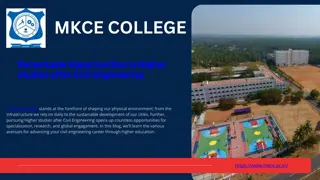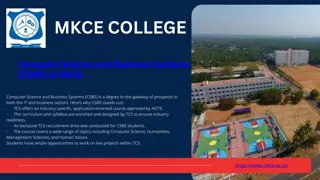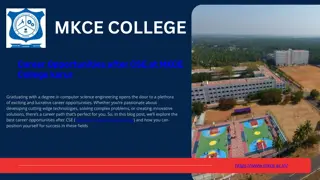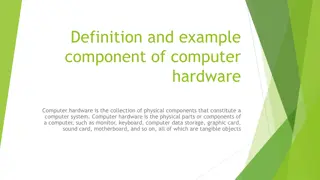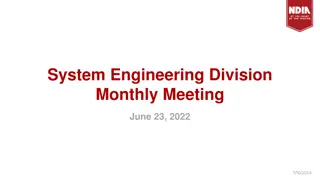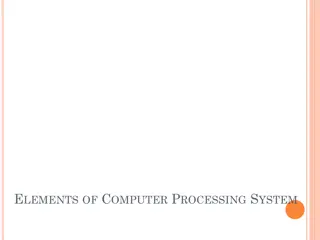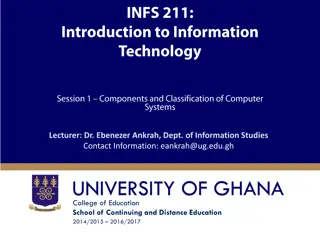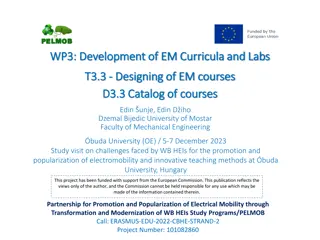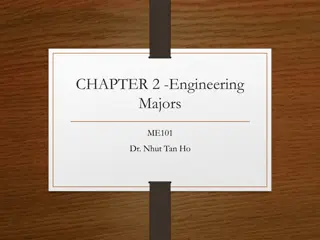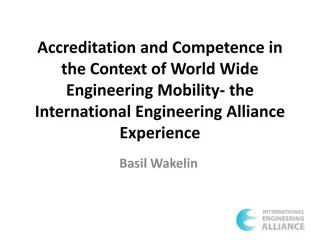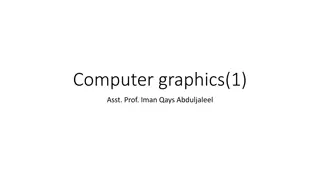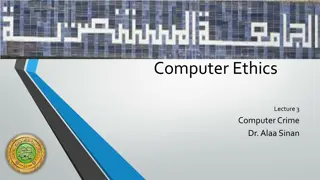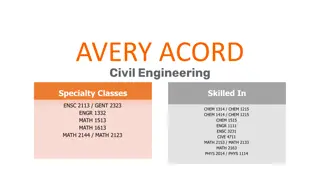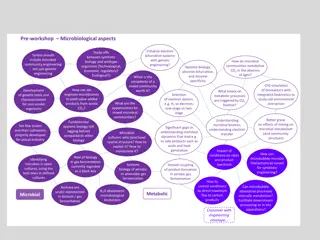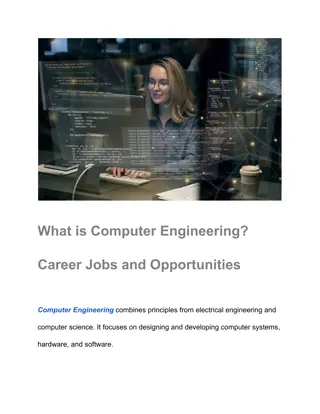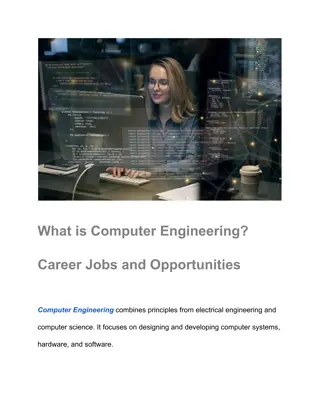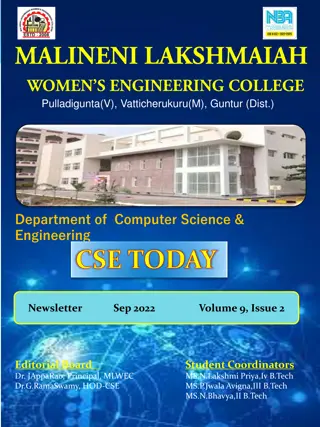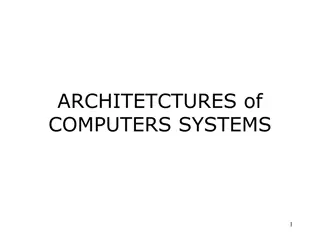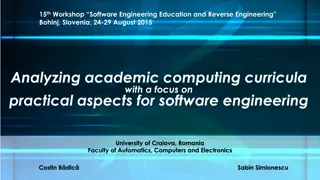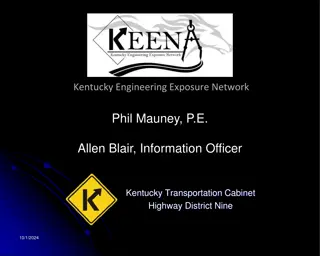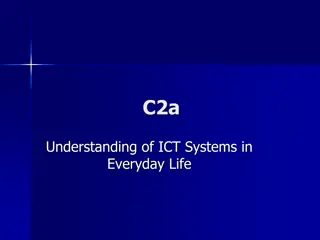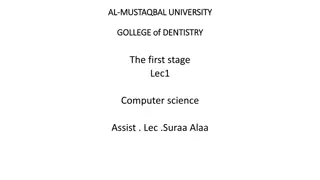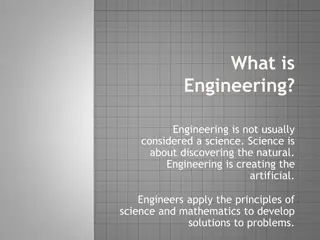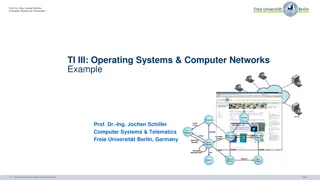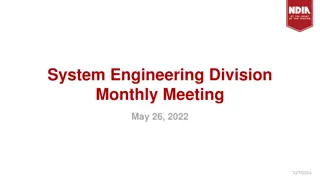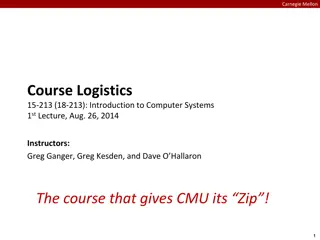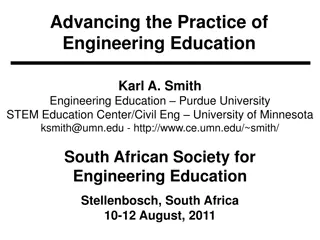Understanding Computer Organization and Architecture
A computer system is a programmable digital electronics device that processes data as per program instructions to provide meaningful output. It comprises hardware and software components, with hardware being the physical parts and software essential for driving the hardware. Computer organization fo
14 views • 71 slides
Introduction to Engineering with ABET, Inc.
Explore the world of engineering with ABET, Inc. Introduce students to accredited schools in West Virginia and different branches of engineering. Learn about essential questions, career opportunities, and the inspiring history of engineering achievements. Discover the difference between engineering
1 views • 19 slides
Ask On Data A Chat Based Data Engineering Tool
In the field of data engineering, accuracy and efficiency are critical. Conventional methods frequently include laborious procedures and intricate interfaces. However, with the rise of chat based data engineering tool such as Ask On Data, a new era of data engineering is beginning. These cutting-edg
2 views • 2 slides
Mkce College Computer Science and Engineering
The Department was established in the year 2000 with an intake of 60 students and our intent is to produce high qualified engineers and researchers who can make substantial contribution to the field of Computer Science and Engineering. The department offers B.E and M.E in Computer Science and Engine
4 views • 2 slides
Remarkable Opportunities in Higher studies after Civil Engineering
Higher studies after Civil Engineering in Tamil Nadu\nCivil engineering stands at the forefront of shaping our physical environment; from the infrastructure we rely on daily to the sustainable development of our cities. Further, pursuing Higher studies after Civil Engineering opens up countless oppo
0 views • 2 slides
Computer Science and Business Systems (CSBS) at MKCE
Computer Science and Business Systems (CSBS) at MKCE\nWelcome to the world of Computer Science and Business Systems (CSBS) at M.Kumarasamy College of Engineering (MKCE), an avant-garde and industry-specific program designed to forge the future leaders of technology and business. Moreover, if you\u20
0 views • 2 slides
Career Opportunities after CSE at MKCE College karur
Career Opportunities after CSE at MKCE College karur\nGraduating with a degree in computer science engineering opens the door to a plethora of exciting and lucrative career opportunities. Whether you\u2019re passionate about developing cutting-edge technologies, solving complex problems, or creating
0 views • 2 slides
Overview of Computer Hardware Components and Software Functions
Computer hardware components such as monitor, CPU, mouse, and projector are essential physical parts of a computer system, while software includes intangible programs like operating systems and utility software. Hardware components perform tasks like displaying data, processing information, and prin
8 views • 9 slides
System Engineering Division Monthly Meeting - June 23, 2022
The System Engineering Division Monthly Meeting held on June 23, 2022, featured discussions on Digital Engineering Metrics Framework, Conference Updates, Systems Engineering Research Center, NDIA SED Committee Updates, SoS/ME Committee Report, and Mission Engineering Initiative Updates. The meeting
0 views • 26 slides
Understanding Computer Architecture and Organization
Computer architecture and organization are fundamental aspects of computing systems. Computer architecture focuses on the functional design and implementation of various computer parts, while computer organization deals with how operational attributes come together to realize the architectural speci
3 views • 40 slides
Computer Science Department Information and Courses Offered
The Computer Science Department provides information on courses offered for GCSE or BTEC qualifications, specifically focusing on the AQA GCSE in Computer Science. The course equips students with valuable thinking and programming skills essential in the modern workplace, covering key concepts and pr
3 views • 7 slides
Understanding Computer Processing Systems
Computer processing systems consist of various components such as the control unit, ALU, input unit, CPU, output unit, memory, and more. Input devices feed raw data to the computer, while output devices provide processed information. The CPU plays a crucial role in executing instructions and data pr
0 views • 13 slides
Introduction to Computer Systems: Components, Types, and Functions
This session conducted by Dr. Ebenezer Ankrah covers the essential aspects of computer systems, including hardware components, types of computer systems, and information systems. Students will gain an understanding of the fundamental principles and characteristics of computer systems, enabling them
0 views • 41 slides
Evolution of Algorithms and Computer Science Through History
The history of algorithms and algorithmic thinking dates back to ancient times, with the development of general-purpose computational machines by Charles Babbage in the 19th century marking a significant advancement. The term "computer science" emerged in 1959, encompassing theoretical computer scie
1 views • 39 slides
Development of Electromobility Curriculum at Dzemal Bijedic University
Edin D.iho Dzemal Bijedic University at Mostar is actively involved in the promotion and modernization of electromobility through the development of innovative teaching methods and curricula. This project, funded by the European Commission under the PELMOB initiative, focuses on designing electromob
0 views • 19 slides
Introduction to Mechanical Engineering: Exploring Career Opportunities and Roles
This content delves into the world of mechanical engineering, covering topics such as the characteristics of students interested in engineering, the distinction between engineers and scientists, and the functions of engineers in research. It also provides insights into the differences between engine
5 views • 41 slides
Evolution of Engineering: From Ancient Innovations to Modern Paradigms
Explore the rich history of engineering from ancient times to the modern industrial revolution. Delve into the origins of the word "engineering," ancient inventions, the beginnings of engineering education in various countries, the paradigm of engineering, and the different types of engineers. Disco
0 views • 64 slides
International Engineering Alliance Experience: Accreditation & Competence
This article explores the International Engineering Alliance's educational accords and mobility agreements, emphasizing the importance of global recognition and adoption of engineering education standards. It discusses the definition of engineering, the characteristics of a profession, and the crite
1 views • 18 slides
Understanding Computer Graphics: An Overview
Computer graphics involves creating images and animations using a computer through hardware and software systems. It has evolved significantly over the years, with advancements in generating various types of computer graphics. Learn about the basics of computer graphics, including digital image repr
0 views • 15 slides
Understanding Computer Crimes and Prevention Strategies
Computer crimes involve illegal acts utilizing computer systems, leading to various consequences. This lecture covers the types of computer system attacks, motives behind computer crimes, costs, prevention strategies, and reflection on the discussed topics. It emphasizes the increasing scope of comp
1 views • 20 slides
Information Systems in Organizations: Overview and Implementation
Information systems play a crucial role in organizations, encompassing transaction processing systems, functional area information systems, and enterprise resource planning systems. This content delves into the purpose of transaction processing systems, the support provided by information systems ac
0 views • 30 slides
Engineering Specialty Classes Overview
Featuring a diverse group of students specializing in various engineering disciplines such as Civil, Electrical, Computer, and Chemical Engineering. The students are skilled in a wide range of classes including Math, Chemistry, Physics, and Engineering courses. Each student excels in their respectiv
0 views • 14 slides
Advancing Microbiological Systems Through Genetic Engineering and Microbial Community Engineering
Exploring the intersection of genetic engineering and microbial community engineering to enhance electron bifurcation systems. Addressing trade-offs between synthetic biology and wildtype organisms, incorporating microbial community engineering in Synbio, and investigating CO2 metabolism in the abse
0 views • 8 slides
Recommended Updates for Engineering Program of Study
The Engineering Program of Study recommendations from the Texas Education Agency (TEA) Career and Technology Education (CTE) Advisory Committee include updates to various fields such as Electrical Engineering, Civil Engineering, and Mechanical and Aerospace Engineering. The proposed program framewor
0 views • 5 slides
What is Computer Engineering_ Career Jobs and Opportunities
Computer engineering is a dynamic field that blends the principles of electrical engineering and computer science to design, develop, and maintain computer systems. This discipline plays a crucial role in the modern digital age, as it focuses on both
0 views • 16 slides
What is Computer Engineering_ Career Jobs and Opportunities
Computer engineering is a dynamic field that blends the principles of electrical engineering and computer science to design, develop, and maintain computer systems.
0 views • 16 slides
Malineni Lakshmaiah Women's Engineering College Department of Computer Science & Engineering (CSE) Newsletter - September 2022
Malineni Lakshmaiah Women's Engineering College, through its Department of Computer Science & Engineering, is dedicated to providing quality education, promoting ethical values, and preparing students for successful careers in the field. The department offers undergraduate and postgraduate programs,
0 views • 11 slides
Engineering Ethics in Practice: A Guide for Engineers by Prof. Dr. Halit Hami Z. - Insights and Reflections
The book "Engineering Ethics in Practice: A Guide for Engineers" by Prof. Dr. Halit Hami Z. from Kafkas University provides insights on a range of ethical issues faced by engineers. Through case studies, it highlights the importance of addressing ethics in engineering work and offers guidance on nav
0 views • 54 slides
Understanding Computer Systems Architectures and Standards
Open systems, standards, client-server models, and internet functionality are crucial components of computer systems architectures. Open systems promote interoperability, standards ensure technical criteria, client-server models define coordination, and the internet provides a communication infrastr
0 views • 34 slides
Analyzing Academic Computing Curricula for Software Engineering Education
This article delves into the analysis of academic computing curricula with a focus on practical aspects for software engineering education. It covers the yearly curricula for a Bachelor's degree in Computer Science, including courses on computer programming, digital systems design, data structures,
1 views • 24 slides
Explore the World of Engineering with Kentucky Engineering Exposure Network
Delve into the diverse field of engineering with the Kentucky Engineering Exposure Network (KEEN). Discover the various types of engineering specialties, the role of engineers in society, and the steps to pursue a career in this dynamic profession. Get insights into civil, structural, geotechnical,
0 views • 52 slides
Understanding ICT Systems in Everyday Life
Explore the basic components of a computer system, including the processor, internal memory, input/output devices, and storage, with a focus on how computer systems function in daily life. Learn about computer monitors, the role of operating systems, RAM and ROM memory types, cache memory, and how c
0 views • 130 slides
Overview of Computer Science at Al Mustaqbal University College of Dentistry
Al Mustaqbal University College of Dentistry offers courses in computer science, covering topics like data reception, processing, storage, and output. The curriculum includes the study of computers as electronic devices, data and information, computer features, operating systems like Windows, and ta
0 views • 10 slides
Exploring the World of Engineering: Types and Applications
Engineering is a creative process that involves applying scientific and mathematical principles to develop solutions. This article delves into the different branches of engineering - Chemical, Civil, Electrical, and Mechanical - showcasing the diverse applications of each field. From discovering pla
0 views • 12 slides
Overview of Prof. Dr.-Ing. Jochen Schiller's Computer Systems & Telematics
This content discusses various aspects of computer systems and telematics as taught by Prof. Dr.-Ing. Jochen Schiller at Freie Universität Berlin, Germany. It covers topics such as operating systems, computer networks, network security, and examples illustrating key concepts. The content explains p
0 views • 31 slides
Understanding Embedded Systems and Cyber-Physical Systems
Embedded systems are specialized computer systems embedded within larger systems, such as control systems and car controllers. This lecture covers real-time aspects, applications of Cyber-Physical Systems (CPS), and examples like the Boeing 777/Airbus A380 cockpit. It discusses the design process of
0 views • 22 slides
System Engineering Division Monthly Meeting Summary - May 26, 2022
The System Engineering Division Monthly Meeting on May 26, 2022, featured discussions on USD Research & Engineering, Mission Engineering Initiatives, Digital Systems Engineering, Committee Reports, and Updates. Presenters included key figures such as Holly Dunlap, Marc Goldenberg, Dr. Judith Dahmann
0 views • 51 slides
Carnegie Mellon Course Logistics: Introduction to Computer Systems
Carnegie Mellon University offers the course 15-213: Introduction to Computer Systems, taught by instructors Greg Ganger, Greg Kesden, and Dave O. Hallaron. The course covers essential topics in computer systems and programming, emphasizing practical skills through lectures, labs, and exams. Recomme
0 views • 23 slides
Engineering Freshmen's Journey at UF - Spring 2016
Raj Shah, Nicholas Poindexter, Andrew Kurland, and Trevor Ross, freshmen students at UF in different engineering disciplines, shared their experiences and aspirations. Raj in Computer Hardware Engineering, Nick in Electrical Engineering, Andrew in Mechanical Engineering, and Trevor in Industrial and
0 views • 9 slides
Advancing Engineering Education: Embracing Innovation and Research
Karl A. Smith, from Purdue University, discusses advancing the practice of engineering education through innovative practices, research, and embracing engineering principles. The focus is on cultivating a loop between research and practice while exploring Rigorous Research in Engineering Education (
0 views • 54 slides




